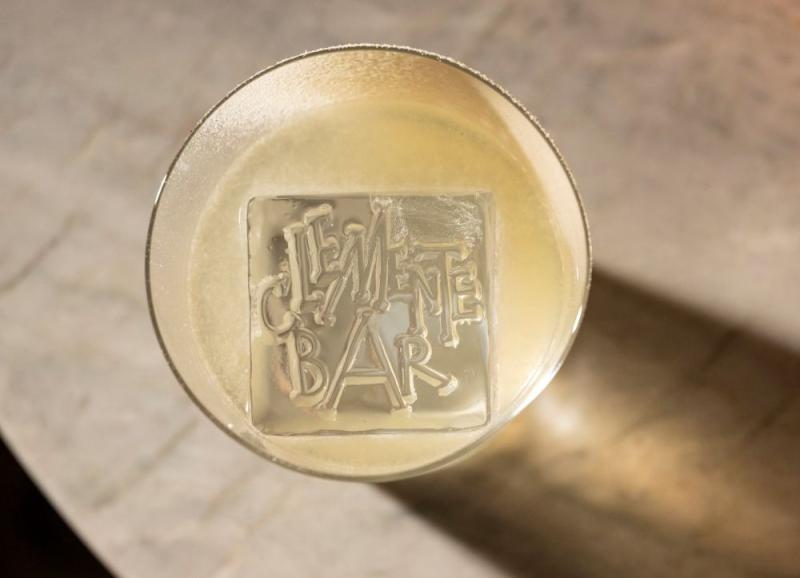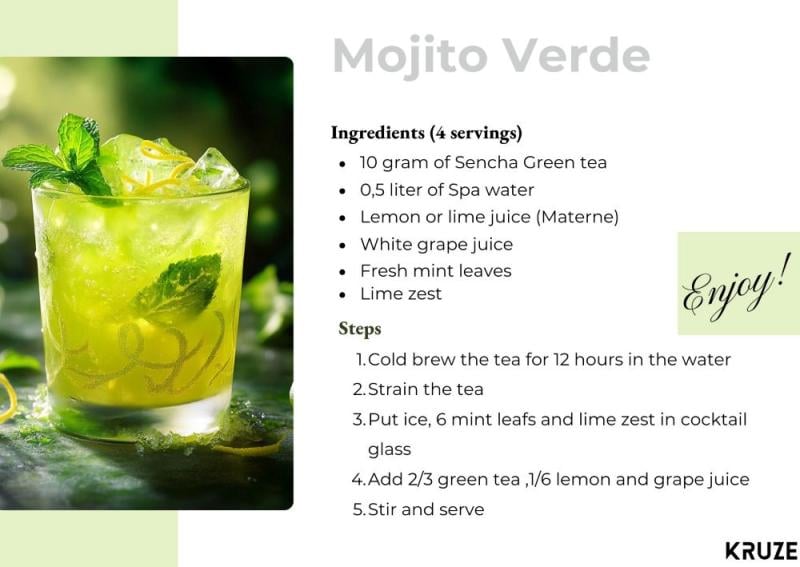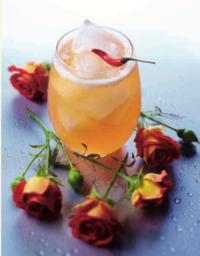In part two of our series on the use of tea in restaurants, we take a look at tea mixology. Miss the first installment? Catch up here!
It’s not just wine that tea has both supplanted and complemented: Tea is now added to many spirits.
“Earl Grey tea goes very well with whisky,” says Lydia Gautier, author, agronomist, tea expert, consultant, and owner of the eponymous brand, Lydia Gautier Natural Teas & Herbals (Thés &Tisanes Naturels). “In one instance, I advised the brewing of rooibos tea and then freezing them into ice cubes, which could be added to whisky or other drinks. Generally, you need a distinctive brew to counter the strong taste and smell of whisky.”
The combination may well make the drink healthier. Rooibos tea is rich in the flavonoids aspalathin and quercetin, which are known to be heart-healthy and lower blood sugar. So, for those with Type II diabetes, especially, who may be cutting down on alcoholic beverages due to its glycemic index, the rooibos ice cubes might mitigate this. They also add a naturally sweet and nutty flavour to the drink, infusing earthy notes with each sip.
Tea Sommelier Gabrielle Jammal, who has been in the restaurant space for most of her career, says that tea bars have sprouted up in the Big Apple during her time there, and she believes they are here to stay.
When New York’s Baccarat Hotel opened in 2015, Jammal, who had by then become certified as a tea sommelier, basically created her role there incorporating tea in the menu, training staff, and supervising service. “And I ran the program there for seven years,” she says.
Jammal started sourcing fine loose-leaf teas and created some interesting pairings. “We did tea and chocolate, tea and whisky, tea and champagne. It was all about creating a different kind of culinary experience,” she says. Just to be clear, the tea is not combined with any of these foods or drinks. They are meant to be consumed separately – the tea first, followed by chocolate or an alcoholic beverage.

“Whatever follows tea tastes different – and of course it makes a difference what kind of tea you use. You need a lighter tea for wine; a darker one for something rich like chocolate,” Jammal explains.
I ask about how it’s done. While the fine dining industry can be rife with elitism, Jammal is refreshingly unpretentious: “It’s literally like tea in one hand whisky in another: smelling them, tasting them separately, tasting them one right after the other. And then seeing how the flavors react in your mouth – maybe what memories and feelings the pairings evoke.”
Acclaimed chef, Hester Blumenthal, whose three restaurants under The Fat Duck umbrella are considered among the best in their class, offers words that are akin to Jammal’s: “You think about some of the most memorable meals you've ever had; the food will be good, but it will often be about locating a mental memory and taste that is inexorably linked to all the other senses and memory, so ultimately it is all about taste.”
Tea must be sipped slowly and has become known for slowing people down and creating moments to savor while looking back. Jammal emphasizes that patrons should take their time and smell both the beverages. The tea, especially, she says should be sipped or slurped, gradually.
Jammal also concocted tea cocktails at The Baccarat Hotel, making liberal use of concentrated tea syrups. Syrups are also used at Eleven Madison Park. Of special mention is hojicha syrup for a stirred cocktail or a chamomile syrup for sours. “It allows for consistency and better flavor control across service,” says Sebastian Tollius, beverage director at New York City’s Eleven Madison Park restaurant.
Mocktails, however, continue to stir the most interest. Stijn Van Schoonlandt, owner of Kruze Coffee and Tea in Belgium and member of the International Tea Masters Association (ITMA), has a favorite mocktail that uses Fukamushi Cha (a deep steamed Japanese green tea) for a virgin mojito, which he finds refreshing. For cocktails, he prefers mojito verde (with green tea), and Ceylon (Sri Lankan) spiced tea in chai for a unique cocktail called a Chai Old Fashioned.

Tollius emphasizes that the critical ingredient in creating non-alcoholic drinks is most definitely tea: “As tea is a main component in our non-alcoholic pairings, it is something our guests have really enjoyed exploring.”
That said, incorporating tea in cocktails can become far more complex than simply adding syrup as Tollius explains: “At Clemente Bar [located upstairs from the Eleven Madison Park dining room], tea plays a more experimental role within cocktails, where we infuse, reduce, or steep teas for clarity, acidity, or tannin structure to pair with food offerings. We treat tea the way we’d approach wine: understanding terroir, oxidation, and body to enhance flavors in a cocktail.”
According to Tollius, green and white teas give off brightness and clarity, while oolongs provide depth and a touch of tannin. Black teas, especially Ceylon or Darjeeling, incorporate well with brown spirits. “We also love using smoked teas, like Lapsang Souchong, sparingly for savory or spirit-forward drinks,” he says.

Hard liquor drinks, which are intrinsically strong in their aromaticity, come with their own challenges in balancing the flavor of the tea with the spirit to create a harmonious cocktail as most teas are tasted first with the nose. “It starts with understanding steep strength and how tea tannins interact with ethanol,” says Tollius.
Tollius mentions that certain spirits lend themselves better to combining with tea than others. “Gin is a natural fit, especially with floral or green teas. Bourbon and oolong or black teas work well together. Rum and rhum Agricole [rum made from sugarcane juice] pairs beautifully with jasmine or mint teas. We try to avoid overproof spirits when tea is the primary ingredient to let the aromas add a more subtle touch to the infusion,” Tollius remarks.
Plan to Attend or Participate in World Tea Expo, March 23-25, 2026
To learn about other key developments, trends, issues, hot topics and products within the global tea community, plan to attend World Tea Expo, March 23-25, 2026 in Las Vegas, co-located with Bar & Restaurant Expo. Visit WorldTeaExpo.com.
To book your sponsorship or exhibit space at World Tea Expo, or to inquire about advertising and sponsorship opportunities at World Tea News, contact:
Ellainy Karaboitis-Christopoulos, Business Development Manager, Questex
Phone: +1-212-895-8493; Email: [email protected]
Looking for professional tea education, certifications, and more? Visit World Tea Academy and register for courses today!
Also, be sure to stay connected with World Tea Expo on social media for details and insights about the event. Follow us on X, Facebook, Instagram and LinkedIn.
